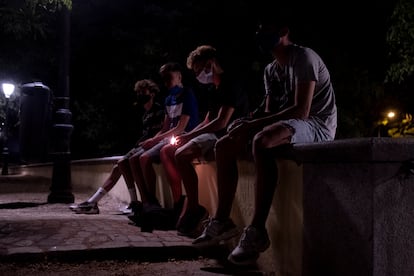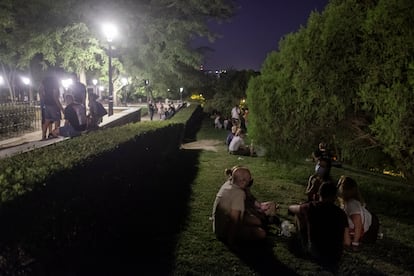Despite Covid-19, ‘botellón’ culture persists in Madrid
Many youths are still meeting in public parks to drink alcohol though they say they’re aware of the risks

The park is dark. But the sound of whispering and laughter gives the teenagers away. Suddenly, four silhouettes are lit up by the flame of a cigarette lighter.
“What we’re doing is wrong,” admits Gustavo, 19.
The other three nod. They’re from different districts in the south of Madrid, but they choose to meet in Las Vistillas park, which requires them all to take public transportation.
They wear their masks around their necks, and the smoke from their cigarettes envelops them in a mist. There are no safety distances: they thump or slap one another from time to time in playful gestures. The four of them are sure they are not infected with the coronavirus. They feel a pang of guilt when it is pointed out that what they are doing is a botellón – literally meaning “big bottle,” which is the practice of drinking alcohol outdoors in groups – in the midst of a second wave of Covid-19 in Spain. They were not born yesterday; they know that what they are doing is wrong. The Health Ministry banned drinking on the street in August.
But…
“What’s the difference between this and a sidewalk café?” says Gustavo. “There, they are all crowded together, back to back with other customers, and the police don’t say anything. But they come and give us hell. Does that make sense? We’re in the middle of nowhere, a long way from anyone.”
“It’s pure business,” says Pablo, 18. “Either you spend money you don’t have in a bar or you get fined. It is ridiculous.”

At that moment, a young woman out to walk her dog approaches. Having overheard the conversation, she wades in. “You make everything dirty and you make noise,” she says.
The boys plead not guilty. They claim that they come with a plastic bag for their garbage and put it in the trash before they leave. They say they even berated a fifth member of the group, who has since left, for throwing his cup of red wine and lemonade on the ground.
The dog walker points to an empty container. “Is that yours?”
“Yes, yes it is. We’ll pick it up now,” comes the reply. Then again, they defend their activity, insisting that they don’t put themselves in any more danger than people in bars or in closed spaces where sooner or later, masks are abandoned. The dog walker relents. “If you look at it like that, you’re probably right.”
During the pandemic, the boys did not fully comply with the lockdown. Pablo, whose father is a truck driver, says that when he went to throw out the trash, he would have a cigarette and a beer with Noe, a neighbor who printed out his high school notes for him. Every time he saw him walk out the door, his father would say, “Be careful, son,” and he would reply, “Don’t worry.” Then Pablo bought a printer and stopped seeing Noe. But she was at least part of the reason he passed the course.
“I didn’t,” says Hugo, 16. “I was held back.”
“What subjects did you fail?”
“Math and Spanish language,” he says. “My mother didn’t want to buy me a motorbike, so I spent the whole summer laying bricks. I’m paying for it myself.”
“Do you have the money for the bike now?”
“Yes,” he says. “I’ve already chosen one and talked to the guy.”
“You mean the guy from the dealership?”
“No way. That’s far too much of a luxury for me. I’ve spoken to a seller on [online classified ads app] Wallapop. But I can’t buy it until I get my driver’s license.”
His friends laugh at him for putting the horse before the cart; also, because he’s skinny and not exactly on the ball. They find it amusing to imagine him laying bricks on a construction site in mid-August.

The authorities have warned that young people gathering in large groups to hang out together could be an important vehicle for infection during the second wave of the pandemic that the country as a whole is experiencing, though particularly Madrid.
On August 30, the number of Covid-19 cases reported over the previous three weeks in the Madrid region was 15,978. The 15-29 age group accounted for 3,502 cases, or 21.9% of the total. To try to tackle these numbers, the regional premier, Isabel Díaz Ayuso of the Popular Party (PP), laid down new regulations, including restricting social gatherings to10 people. The measure will affect the young above all, as they tend towards large groups.
The police are charged with seeing the new regulations are complied with, and a patrol car with its lights on is stationed near Parque del Oeste. The silence is absolute. But a short walk away along the Moret promenade, there are sounds of human activity. On one slope, groups of young people and families are drinking, eating, playing board games and generally enjoying the evening. It is a snapshot more typical of pre-Covid summer nights – the old normality.
Gathered around a pine tree and a bag containing alcohol, ice and mixers is a group of youngsters in their late teens brimming with hormones.
“Get the clubs back open!” says one.
“Yes!”
Ranging in age between 19 and 23, they are dressed neatly in polo shirts, shorts and boat shoes. All are law students except for Arancha, who is studying pharmacology. Asked if they aren’t worried about Covid-19, one says, “I don’t care. I’ve got antibodies.”
“But antibodies don’t last forever.”
Arancha comes to the defense of her friend. Her arms crossed, she says, “Well, they don’t know that yet.”
These youngsters seem to have no fear, although they claim to take precautions. As if to prove this, one member of the group named Marcos says: “At home I don’t even eat with my parents. Everyone has to be aware and responsible.”
Then, without missing a beat, they add that they are about to leave for an apartment in the city center where around 20 of their friends are meeting to party.
Madrid regional authorities have laid down new regulations, including a ceiling on social gatherings of 10 people
In July, the local police slapped a total of 5,365 fines on people for drinking illegally outdoors – 232% more than the previous year. But this does not deter a group that settles on the steps of the Cerro del Tío Pío park in Vallecas, where there is a stellar view of the Madrid skyline completely free of charge.
It is just after 8pm, and the six youngsters who make up the group pour themselves a large beaker of red wine and lemonade each. Their masks were removed as soon as they sat down and got their cigarettes out. It’s as though they were sitting in their own living room. Maria, 17, says this is what they do on a regular basis. “We come here quite often, several times a week. But we don’t usually stay after midnight, we have to go home.”
“Don’t the police bother you?”
“They go round in their car and they go slow when they see us, but they don’t say anything.”
There is enough distance here between groups. In another corner of the park, Eddie has come for the first time to spend the evening with two couples and their kids. Spread around them are containers of food, a few liters of beer and a large water pipe to share among the adults. “We’re not worried about the virus here,” says Eddie. “This is an open space and there’s a breeze, and besides, we are all family.”
But it’s already 10pm, the time the parks are due to close by law. “Do they really close?” asks Eddie incredulously. He looks at his friend, who recommended the place, laughs and then changes the reggaeton song coming out of the speaker.
English version by Heather Galloway.
Tu suscripción se está usando en otro dispositivo
¿Quieres añadir otro usuario a tu suscripción?
Si continúas leyendo en este dispositivo, no se podrá leer en el otro.
FlechaTu suscripción se está usando en otro dispositivo y solo puedes acceder a EL PAÍS desde un dispositivo a la vez.
Si quieres compartir tu cuenta, cambia tu suscripción a la modalidad Premium, así podrás añadir otro usuario. Cada uno accederá con su propia cuenta de email, lo que os permitirá personalizar vuestra experiencia en EL PAÍS.
¿Tienes una suscripción de empresa? Accede aquí para contratar más cuentas.
En el caso de no saber quién está usando tu cuenta, te recomendamos cambiar tu contraseña aquí.
Si decides continuar compartiendo tu cuenta, este mensaje se mostrará en tu dispositivo y en el de la otra persona que está usando tu cuenta de forma indefinida, afectando a tu experiencia de lectura. Puedes consultar aquí los términos y condiciones de la suscripción digital.








































